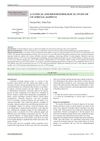 7 citations,
December 2008 in “Journal of Dermatological Science”
7 citations,
December 2008 in “Journal of Dermatological Science” Progranulin overexpression leads to shorter, thinner hair and increased cell death in mouse hair follicles.
 6 citations,
February 2022 in “The journal of neuroscience/The Journal of neuroscience”
6 citations,
February 2022 in “The journal of neuroscience/The Journal of neuroscience” Deleting the PTEN gene in mice causes nerve cells to grow larger and heal better after injury, but may cause overgrowth and hair loss in older mice.
 6 citations,
November 2018 in “Antimicrobial agents and chemotherapy (Print)”
6 citations,
November 2018 in “Antimicrobial agents and chemotherapy (Print)” Fluconazole can cause hair loss, but the exact cause is unknown.
 6 citations,
April 2017 in “Journal of Dermatological Science”
6 citations,
April 2017 in “Journal of Dermatological Science” Ovariectomized mice mimic postmenopausal hair loss, and estradiol helps maintain hair density.
 5 citations,
September 2018 in “Bioscience, Biotechnology, and Biochemistry”
5 citations,
September 2018 in “Bioscience, Biotechnology, and Biochemistry” Thiosulfate may help hair grow faster in mice and works well with a common hair growth treatment.
 5 citations,
July 2013 in “Our Dermatology Online”
5 citations,
July 2013 in “Our Dermatology Online” Lichen planopilaris is the most common type of scarring hair loss observed, with a variety of symptoms and tissue changes.
 4 citations,
September 2020 in “BioMed Research International”
4 citations,
September 2020 in “BioMed Research International” Timosaponin BII, a plant extract, was found to promote hair growth in mice, similarly to minoxidil.
 4 citations,
March 2019 in “Experimental Biology and Medicine”
4 citations,
March 2019 in “Experimental Biology and Medicine” Exposure to 50 Hz electromagnetic fields may help mice grow hair faster.
 4 citations,
December 2015 in “Journal of Medicinal Plants Research”
4 citations,
December 2015 in “Journal of Medicinal Plants Research” A plant mixture extract helped grow hair by boosting cell growth and growth factors while blocking a hair loss-related enzyme.
 4 citations,
January 2014 in “The Scientific World Journal”
4 citations,
January 2014 in “The Scientific World Journal” Red deer antler extract helps hair grow by extending the growth phase and increasing cell growth in hair follicles.
 3 citations,
February 2019 in “Journal of Cosmetic Dermatology”
3 citations,
February 2019 in “Journal of Cosmetic Dermatology” The effects of estrogen on human scalp hair growth are unclear and need more research.
 3 citations,
June 2017 in “International Journal of Radiation Biology”
3 citations,
June 2017 in “International Journal of Radiation Biology” Gamma rays did not change hair follicle density but increased white and hypopigmented hairs in mice.
 2 citations,
February 2019 in “Journal of Investigative Dermatology”
2 citations,
February 2019 in “Journal of Investigative Dermatology” Higher levels of the DP2 receptor may lead to hair loss.
 2 citations,
August 2016 in “Lasers in Surgery and Medicine”
2 citations,
August 2016 in “Lasers in Surgery and Medicine” Photodynamic therapy can remove nonpigmented hair in mice and might work for humans.
 2 citations,
December 2004 in “Medicine”
2 citations,
December 2004 in “Medicine” Different hair and scalp disorders cause hair loss or excess hair growth, with various treatments available depending on the specific condition.
 1 citations,
May 2017 in “InTech eBooks”
1 citations,
May 2017 in “InTech eBooks” Telogen Effluvium is a common hair loss condition that can be short-term or long-lasting and is often caused by stress, illness, or nutritional issues.
 1 citations,
January 2015 in “Genetics and Molecular Research”
1 citations,
January 2015 in “Genetics and Molecular Research” Stopping S100A3 activity slows down hair growth in mice.
 1 citations,
May 2013 in “Journal of the Egyptian Women's Dermatologic Society (Print)”
1 citations,
May 2013 in “Journal of the Egyptian Women's Dermatologic Society (Print)” Women with idiopathic hirsutism and PCOS have higher RBP4 levels, and PCOS is linked to greater insulin resistance; weight management may help both conditions.
 1 citations,
January 1987 in “Journal of The American Academy of Dermatology”
1 citations,
January 1987 in “Journal of The American Academy of Dermatology” The patient's hair loss was likely not caused by beta blockers but possibly by stress or other factors.
 June 2024 in “Frontiers in pharmacology”
June 2024 in “Frontiers in pharmacology” 2-deoxy-D-ribose gel may help regrow hair in cases of hair loss.
 April 2024 in “Frontiers in physiology”
April 2024 in “Frontiers in physiology” Immune cells are crucial for hair growth and preventing hair loss.
 March 2024 in “Medical lasers”
March 2024 in “Medical lasers” Multiple-wavelength radiation helps hair grow by boosting early hair follicle development.
 November 2023 in “Food science of animal resources”
November 2023 in “Food science of animal resources” Lactilactobacillus curvatus LB-P9 taken orally helps hair regrow faster and thicker in mice.
 January 2019 in “Springer eBooks”
January 2019 in “Springer eBooks” Some chemicals and drugs can cause hair loss, which usually grows back after stopping the treatment.
 July 2018 in “Journal of College of Medical Sciences-nepal”
July 2018 in “Journal of College of Medical Sciences-nepal” Women with certain types of hair loss may have low iron levels.
 June 2017 in “Experimental and Therapeutic Medicine”
June 2017 in “Experimental and Therapeutic Medicine” The anti-CXCL4 antibody helps mice grow hair faster and prevents hair loss.

Integrin alphavbeta6 is important for wound healing and hair growth, and blocking it may improve these processes.
 883 citations,
August 2016 in “Nature Reviews Disease Primers”
883 citations,
August 2016 in “Nature Reviews Disease Primers” Polycystic Ovary Syndrome (PCOS) is a common condition in women that can cause metabolic, reproductive, and psychological issues, and requires lifestyle changes and medication for management.
 520 citations,
February 2001 in “Journal of Clinical Investigation”
520 citations,
February 2001 in “Journal of Clinical Investigation” VEGF helps hair grow and determines follicle size by increasing blood vessel growth.
 254 citations,
January 2012 in “Nature Reviews Molecular Cell Biology”
254 citations,
January 2012 in “Nature Reviews Molecular Cell Biology” Stem cell offspring help control their parent stem cells, affecting tissue health, healing, and cancer.






























